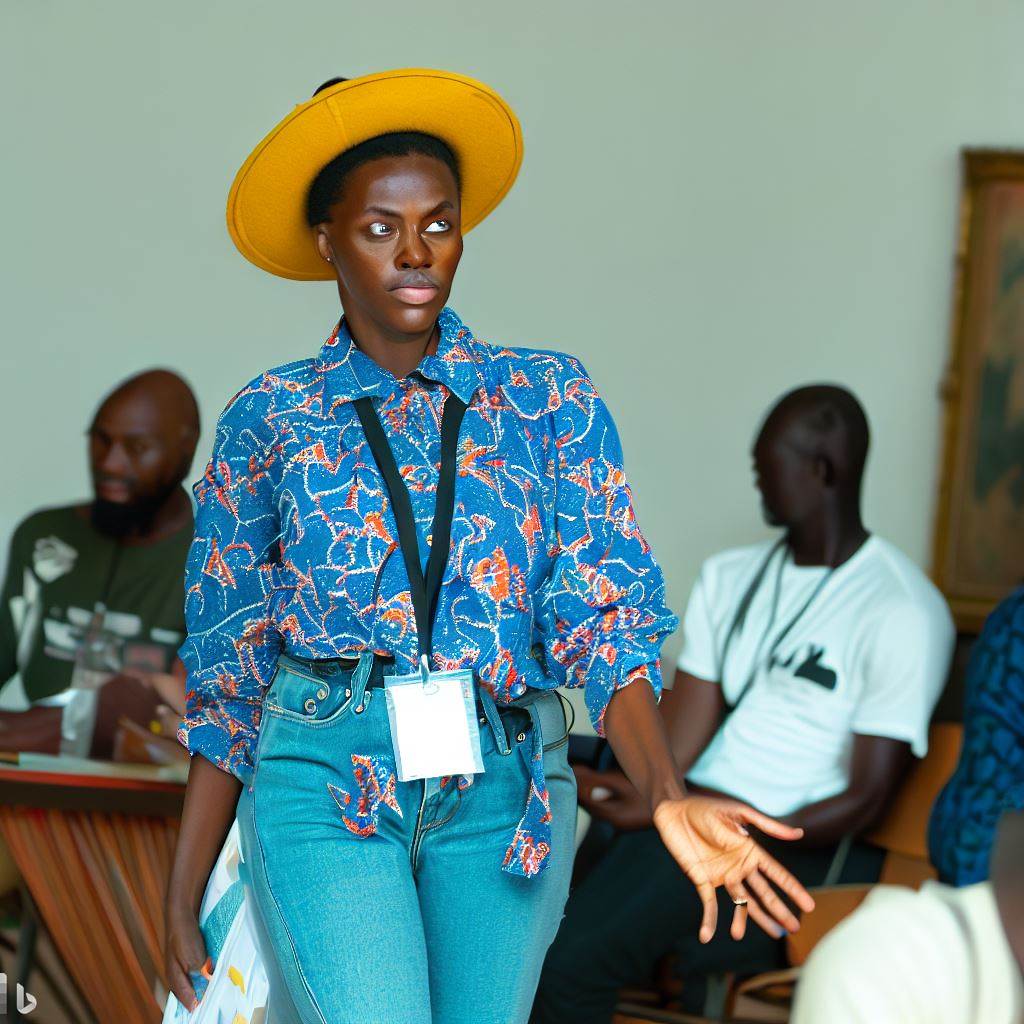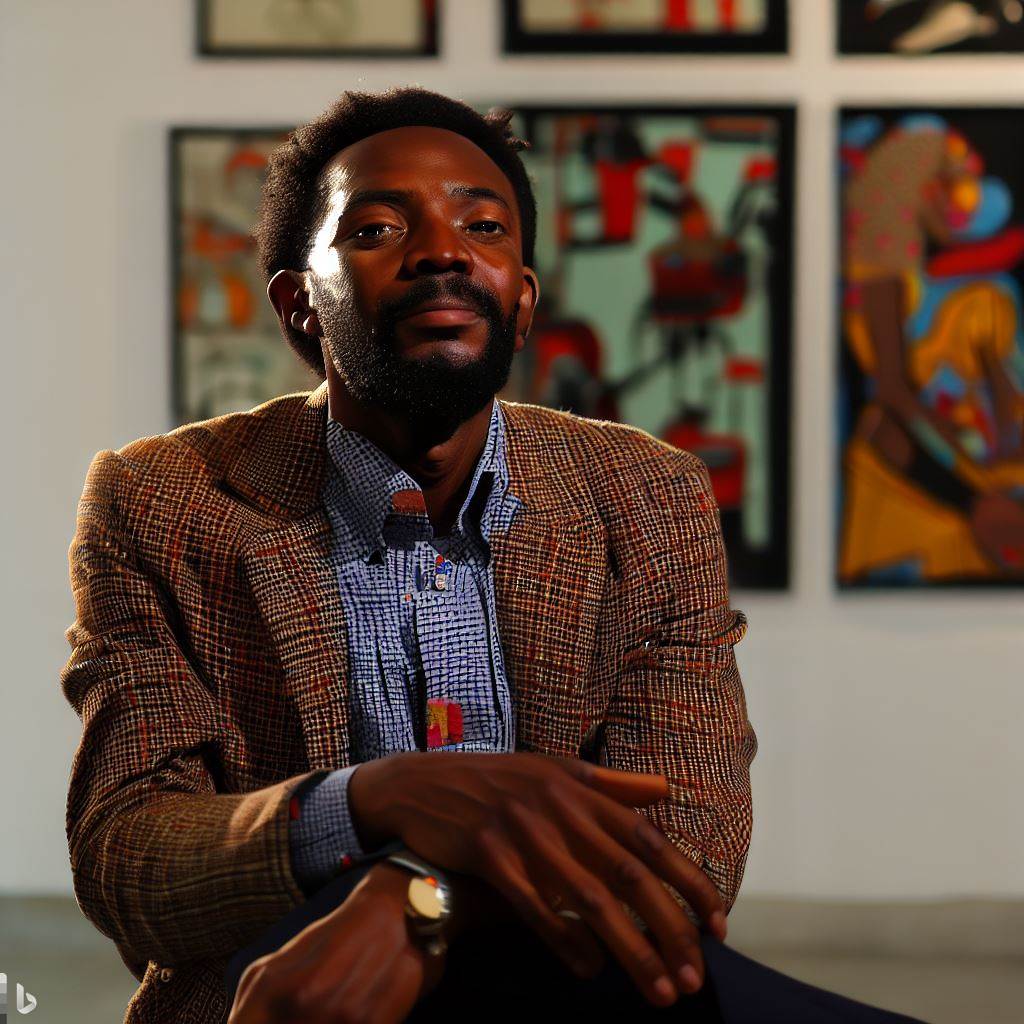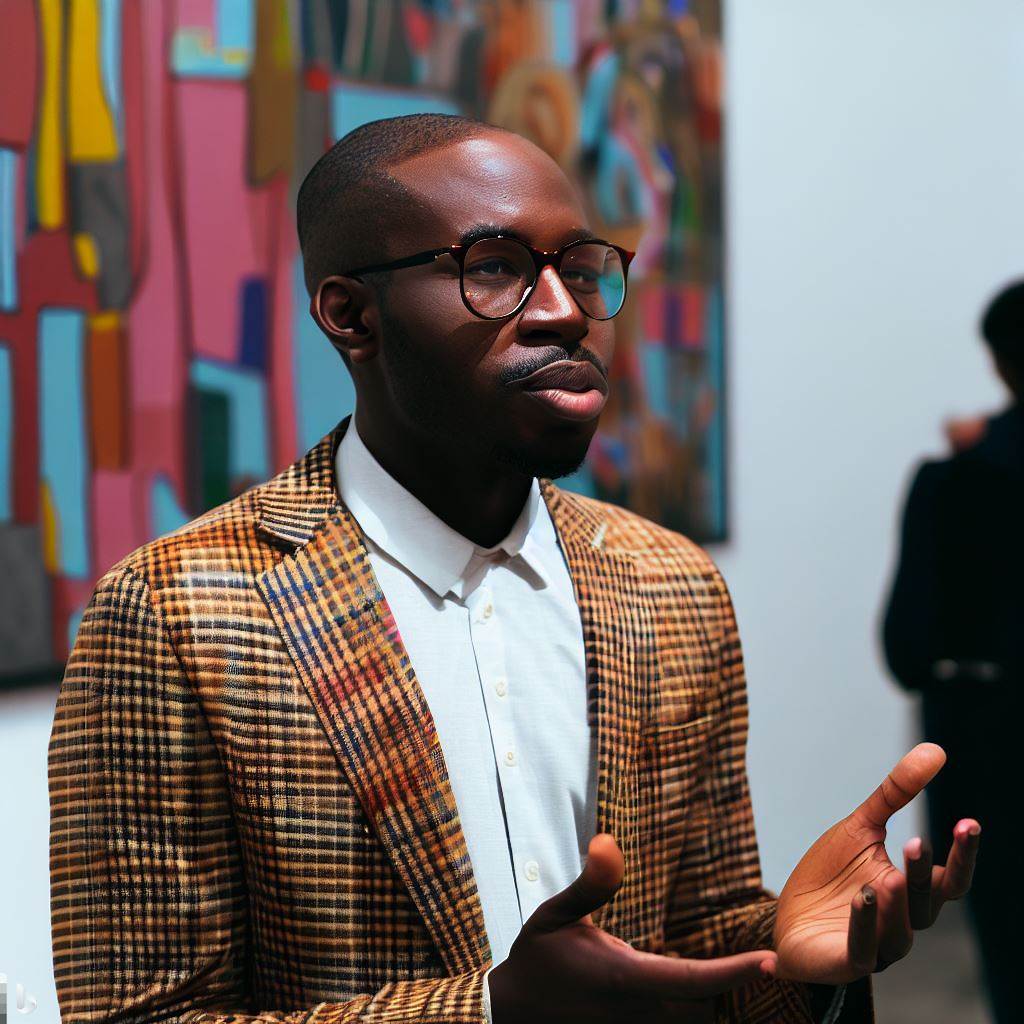Introduction
Curators play a vital role in preserving and interpreting Nigeria’s rich cultural heritage.
They are responsible for safeguarding historical artifacts and artworks, ensuring their conservation and making them accessible to the public.
Aspiring curators in Nigeria have various educational paths to pursue their career dreams.
These educational paths equip them with the necessary skills and knowledge to excel in the field.
The importance of curators in preserving and interpreting cultural heritage
By obtaining a bachelor’s degree in Art History, aspiring curators can gain a solid foundation in the historical and artistic aspects of Nigeria’s culture.
This degree program trains students in critical analysis, research skills, and the interpretation of visual objects.
Another educational path that aspiring curators can take is by pursuing a master’s degree in Museum Studies.
This specialized program focuses on museum management, exhibition design, and collections management.
It provides aspiring curators with a comprehensive understanding of the practical aspects of running a museum.
Additionally, aspiring curators can benefit from internships and hands-on experience.
These opportunities allow them to work directly with museum professionals, gain practical skills, and develop a network within the industry.
Furthermore, aspiring curators can attend workshops, conferences, and seminars to expand their knowledge and stay updated with current museum practices and trends.
Aspiring curators in Nigeria have various educational paths to choose from.
Earn Art History or Museum Studies degrees, gain internship experience, and attend workshops to pursue a fulfilling cultural heritage career in Nigeria.
Overview of the Curatorial Profession
- A curator is responsible for the selection, preservation, and display of art and cultural artifacts.
- Their role involves organizing exhibitions, conducting research, and collaborating with artists and collectors.
- A curator is also responsible for interpreting and contextualizing artworks, providing educational programs, and managing collections.
- Curators work in various settings, including museums, galleries, historical sites, and cultural institutions.
A. Role and responsibilities of a curator
- A curator is responsible for acquiring and cataloging artworks, ensuring their proper storage and conservation.
- They develop and implement exhibition concepts, selecting artworks and arranging them in a coherent and engaging manner.
- Curators write descriptions and labels for artworks, helping visitors interpret and understand the artistic context.
- They collaborate with artists, collectors, and other professionals to organize exhibitions and cultural events.
- Curators may also conduct research, publish articles, and give lectures to share their knowledge with the public.
B. Skills and knowledge required for a successful career as a curator
- A successful curator needs a deep knowledge and understanding of art history and cultural heritage.
- Strong research, analytical, and critical thinking skills are essential for interpreting artworks and developing exhibitions.
- Curators must have excellent communication and writing skills to convey information and engage with diverse audiences.
- Organizational and project management skills are crucial for planning and executing exhibitions and events.
- Curators should be creative, open-minded, and able to think outside the box to present art in innovative ways.
C. Importance of formal education in the curatorial field
- A formal education in art history, museum studies, or a related field is highly valued in the curatorial profession.
- It provides a solid foundation in art theory, research methodologies, and curatorial practices.
- Studying in this field allows aspiring curators to gain specialized knowledge in specific art movements or cultural periods.
- Formal education also provides opportunities for internships, networking, and practical experience in the curatorial field.
- Job prospects and career advancement are often more accessible for curators with formal education and relevant qualifications.
Becoming a curator in Nigeria requires a combination of knowledge, skills, and formal education.
Curators play a vital role in preserving and presenting art and cultural heritage.
Their responsibilities encompass diverse tasks, from collection management to exhibition organization.
Formal education provides aspiring curators with the necessary knowledge and skills to succeed in this field and opens up opportunities for career growth.
Available educational paths in Nigeria
A. Undergraduate Degree Options in Curatorial Studies
For aspiring curators in Nigeria, there are various undergraduate degree options that can pave the way for a successful career in curatorial studies.
These degree programs provide students with a solid foundation in relevant disciplines and equip them with the necessary skills and knowledge to thrive in the field.
B. Relevant disciplines such as art history, museum studies, archaeology, anthropology
- Art History: Art history is a popular undergraduate degree options for those interested in curatorial studies.
This program the historical,cultural, and aesthetic aspects of art, making it an ideal choice for aspiring curators. - Museum studies: Museum studies is another relevant discipline that offers specialized training in museum management, curation, exhibition design, and collection preservation.
This program provides a comprehensive understanding of the museum world. - Archaeology: Archaeology plays a crucial role in curatorial studies as it involves the study of past civilizations through material remains.
Pursuing a degree in archaeology can provide valuable insights into curating ancient artifacts. - Anthropology: Anthropology is an interdisciplinary field that examines human societies and cultures.
This degree option can be beneficial for curators working with ethnographic collections or organizing exhibitions focusing on diverse cultures.
C. Information on universities or institutions in Nigeria offering these programs
Nigeria boasts several universities and institutions that offer undergraduate programs related to curatorial studies.
- University of lagos(UNILAG): UNILAG offers a Bachelor of Arts in Art History, which covers various aspects of art, including its history, theory, and criticism. The program prepares students for careers in curating and art administration.
- University of Nigeria, Nsukka (UNN): UNN provides a Bachelor of Arts in Archaeology and Tourism, combining the study of archaeological materials with the knowledge of tourism management. This program is ideal for aspiring curators interested in archaeology.
- Ahmadu Bello university (ABU): ABU offers a Bachelor of Arts in Archaeology that equips students with the skills needed to understand African history and culture through archaeological research. This program prepares students for curatorial roles.
- Obafemi Awolowo University (OAU):OAU provides students with a comprehensive understanding of the museum profession, including curation, conservation, and exhibition design through its Bachelor of Arts in Museum Studies. Graduates are well-prepared for curatorial careers.
These are just a few examples of the educational paths available for aspiring curators in Nigeria.
Pursuing an undergraduate degree in disciplines such as art history, museum studies, archaeology, or anthropology can open doors to a range of exciting curatorial opportunities.
Remember, success in the field of curatorial studies requires not only academic knowledge but also practical experience, internships, and networking within the industry.
So, be proactive, seize opportunities, and always stay curious!
Read: The Role of Curators in Nigeria’s Growing Art Scene
Internship and Practical Training
Internships and practical training offer invaluable hands-on experience for aspiring curators in Nigeria.
A. The value of internship
Internships provide practical experience that cannot be gained in a classroom setting.
They allow aspiring curators to apply their theoretical knowledge in a real-world setting.
Internships allow individuals to develop crucial skills such as research, curation, and exhibition planning.
Working alongside professionals in the field provides mentorship and guidance for professional growth.
Internships enhance resumes and make individuals more competitive in the job market.
B. Organizations and museums in Nigeria with internship programs
- National Museum Lagos: Offers internships in various departments, including curatorial and conservation.
- Centre for Contemporary Art, Lagos: Provides internships in curatorial and administrative roles.
- Olusegun Obasanjo Presidential Library: Offers internship programs in museology and collection management.
- Osu Castle (Fort Christiansborg): Provides internships focused on preserving historical artifacts.
- Lekki Conservation Centre: Offers internships for individuals interested in environmental conservation and education.
C. Learning opportunities and networking possibilities during internships
Internships provide the opportunity to learn from experienced professionals in the field.
Working on real projects allows interns to gain a comprehensive understanding of museum operations.
Interns can participate in educational programs and workshops organized by the hosting organizations.
Networking opportunities during internships allow for connections with industry professionals and potential mentors.
Interns can participate in meetings, conferences, and events to expand their knowledge and meet stakeholders.
Internships and practical training play a crucial role in the educational paths of aspiring curators in Nigeria.
They offer hands-on experience, valuable learning opportunities, and networking possibilities that enhance skills and career prospects.
Aspiring curators can seek internships at various organizations and museums in Nigeria to gain practical experience and learn from industry professionals.
Read: Tools and Equipment for Chefs in Nigeria: Essentials

Postgraduate Options for Specialized Education
A. The advantages of pursuing a postgraduate degree in curatorial studies
- Pursuing a postgraduate degree in curatorial studies offers several advantages.
- One advantage is the opportunity to gain advanced knowledge and skills in the field.
- Postgraduate programs provide a deeper understanding of curatorial practices and techniques.
- By studying curatorial studies at a postgraduate level, aspiring curators can develop expertise in their chosen area.
- Postgraduate degrees also offer networking opportunities, allowing students to connect with industry professionals.
B. Master’s programs or specialized courses available in Nigeria
- Nigeria offers various master’s programs and specialized courses in curatorial studies.
- The University of Lagos offers a Master’s in Curatorial Studies, providing comprehensive training in the field.
- Another option is the Master’s in Art History and Curatorial Studies at Ahmadu Bello University.
- Ahmadu Bello University also offers a Diploma in Curatorial Studies for those seeking a shorter program.
- The National Gallery of Art in Lagos provides specialized courses and workshops for aspiring curators
C. Skills and knowledge acquired through advanced education
- Advanced education in curatorial studies equips individuals with a range of valuable skills.
- Students learn how to curate exhibitions, manage art collections, and conduct research.
- They acquire expertise in art preservation, conservation, and restoration techniques.
- Advanced education also enhances critical thinking, analytical, and problem-solving skills.
- Students develop a deep understanding of art history, cultural heritage, and the global art landscape
The specific skills and knowledge acquired will vary depending on the field of study and the level of education pursued.
Read: A Chef’s Guide to Nigerian Street Food Culture
Professional Development and Networking Opportunities
Continuous learning and professional development are crucial for aspiring curators in Nigeria.
A. The importance of continuous learning and professional development in the field of curation
By staying updated with the latest trends, techniques, and practices in the field of curation, individuals can enhance their skills and knowledge, becoming more competitive in the industry.
Attending workshops, conferences, and seminars related to curatorial practices in Nigeria provides valuable learning experiences.
These events offer opportunities to hear from industry experts, gain insights into current trends, and engage in interactive sessions.
The knowledge gained from these gatherings can be applied to improve curatorial practices and expand one’s creative horizons.
B. Workshops, conferences, and seminars related to curatorial practices in Nigeria
One prominent workshop in Nigeria is the “Curatorial Practices Workshop” organized annually by the Nigerian Curators Association (NCA).
This workshop brings together curators from different regions, providing a platform for learning, collaboration, and the exchange of ideas.
Participants have the chance to attend lectures, practical sessions, and interactive discussions on various curatorial topics.
Another notable event is the “National Conference on Curatorial Practices,” which is held biennially in Lagos. This conference attracts curators, scholars, and artists from across the country.
It addresses emerging issues in the field, showcases innovative curatorial approaches, and explores the intersection of art and culture.
The conference offers a wealth of knowledge and networking opportunities for aspiring curators.
Furthermore, various organizations and institutions in Nigeria host seminars on curatorial practices.
These seminars serve as platforms for experts to share their insights, research findings, and experiences with attendees.
They cover diverse subjects such as exhibition design, collection management, funding strategies, and audience engagement.
Attending these seminars allows aspiring curators to gain practical knowledge and develop a comprehensive understanding of curatorial practices.
C. The value of networking with professionals in the industry
In addition to professional development, networking plays a vital role in the growth and success of aspiring curators.
Building connections with professionals in the industry can open doors to collaborations, mentorship opportunities, and job prospects.
Networking events, such as art openings, gallery receptions, and industry conferences, provide avenues to meet and interact with established curators, gallery owners, and collectors.
The Nigerian Art Curators Association (NACA) organizes networking events specifically for curators to connect and share their experiences.
These events enable aspiring curators to build relationships, exchange ideas, and seek guidance from established professionals.
By networking with experienced curators, individuals can gain valuable insights into the industry, learn from their journeys, and potentially find mentors who can guide them in their career paths.
Networking also aids in discovering new opportunities, such as internships, residencies, and curatorial positions.
Professionals in the industry often hear about job openings and other opportunities first-hand and can provide valuable information and recommendations.
By nurturing professional connections, aspiring curators can stay informed about potential career advancements and stay ahead in the competitive field of curation.
Lastly continuous learning through workshops, conferences, and seminars, as well as networking with professionals in the industry, are vital for aspiring curators in Nigeria.
These opportunities provide invaluable knowledge, enhance skills, and create connections that can propel individuals towards successful curatorial careers.
It is essential for aspiring curators to actively seek these professional development and networking opportunities to stay competitive and thrive in the dynamic world of curation.
Read: International Opportunities for Nigerian Chefs
Challenges and Opportunities in the Nigerian Context
Aspiring curators in Nigeria face numerous challenges that hinder their educational paths and professional development.
A. Challenges faced by aspiring curators in Nigeria, such as limited resources, funding issues, and lack of awareness
Limited resources, funding issues, and lack of awareness are some of the major obstacles they encounter.
The scarcity of resources is a significant challenge faced by aspiring curators in Nigeria.
Museums and galleries often lack adequate collections, exhibition spaces, and up-to-date technology, making it difficult for curators to showcase their work effectively.
Another challenge is the lack of funding for curatorial projects. Many aspiring curators struggle to secure financial support to organize exhibitions, attend conferences, or conduct research.
This limited funding restricts their ability to gain practical experience and engage with international curatorial practices.
Furthermore, there is a general lack of awareness about curatorial studies and the importance of curators in Nigeria.
As a result, aspiring curators often face skepticism or misunderstanding from their families, communities, and even within the art industry itself.
This lack of recognition hinders their professional growth and networking opportunities.
B. Opportunities and initiatives in Nigeria that are supporting the growth of curatorial practices
Despite these challenges, Nigeria also presents a range of opportunities and initiatives that support the growth of curatorial practices.
One such opportunity is the increasing interest in Nigerian art and culture both nationally and internationally.
This growing interest has led to collaborations between local and international curators, creating platforms for aspiring curators to learn and exchange ideas.
Additionally, several institutions in Nigeria are actively working to provide opportunities for aspiring curators.
The African Artists’ Foundation, for example, offers an annual Curatorial Intensive program that equips participants with the skills and knowledge needed to curate exhibitions.
Similarly, the Centre for Contemporary Art in Lagos organizes curatorial workshops and residencies, providing aspiring curators with valuable practical experience.
C. The importance of perseverance and finding creative solutions to overcome challenges
Perseverance is crucial for aspiring curators in Nigeria. Despite the challenges they face, they must remain determined and proactive in finding creative solutions.
This could involve seeking alternative funding sources, partnering with other cultural organizations, or utilizing digital platforms to reach a wider audience.
Publish Your Professional Profile, Business or Brand
Showcase your expertise, gain trust, and boost visibility instantly on Professions.ng.
Publish NowAspiring curators in Nigeria encounter various challenges such as limited resources, funding issues, and lack of awareness.
However, there are opportunities and initiatives that support their education and professional growth.
By persevering and finding creative solutions, aspiring curators can overcome these challenges and contribute to the development of curatorial practices in Nigeria.
Uncover the Details: Nigeria’s Top Customer Service Events & Conferences 2023
Conclusion
Aspiring curators in Nigeria have various educational paths to explore. They can pursue degrees in art history, museum studies, or related fields.
It is crucial for them to research different programs and choose the one that aligns with their interests and goals.
Aspiring curators should also consider gaining practical experience through internships or volunteer work. This can provide them with hands-on skills and networking opportunities in the industry.
It is vital to encourage aspiring curators in Nigeria to pursue their passion and explore the educational options available to them.
By acquiring the necessary knowledge and skills, they can make significant contributions in preserving Nigeria’s rich cultural heritage.
Curators play a crucial role in safeguarding and showcasing Nigeria’s artistic and historical treasures.
Their efforts ensure that these cultural artifacts are preserved for future generations to appreciate and learn from.
In the end, pursuing a career as a curator requires dedication, continuous learning, and a deep appreciation for Nigerian culture.
Aspiring curators should seize the opportunities available and follow their passion in preserving and promoting Nigeria’s cultural heritage.




